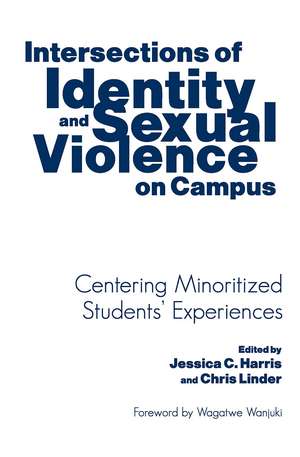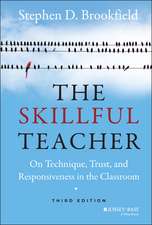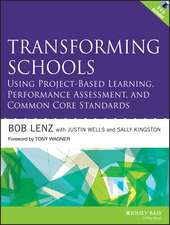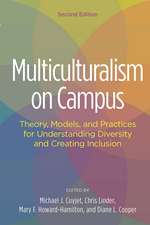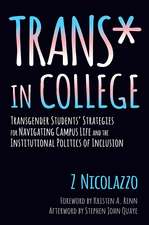Intersections of Identity and Sexual Violence on Campus: Centering Minoritized Students' Experiences
Editat de Jessica C. Harris, Chris Linderen Limba Engleză Hardback – 21 feb 2017
| Toate formatele și edițiile | Preț | Express |
|---|---|---|
| Paperback (1) | 292.40 lei 43-57 zile | |
| Taylor & Francis – 15 feb 2017 | 292.40 lei 43-57 zile | |
| Hardback (1) | 1162.52 lei 43-57 zile | |
| Taylor & Francis – 21 feb 2017 | 1162.52 lei 43-57 zile |
Preț: 1162.52 lei
Preț vechi: 1223.70 lei
-5% Nou
Puncte Express: 1744
Preț estimativ în valută:
222.47€ • 230.95$ • 185.51£
222.47€ • 230.95$ • 185.51£
Carte tipărită la comandă
Livrare economică 24 martie-07 aprilie
Preluare comenzi: 021 569.72.76
Specificații
ISBN-13: 9781620363874
ISBN-10: 1620363879
Pagini: 292
Dimensiuni: 152 x 229 x 28 mm
Greutate: 0.54 kg
Ediția:1
Editura: Taylor & Francis
Colecția Routledge
Locul publicării:Oxford, United Kingdom
ISBN-10: 1620363879
Pagini: 292
Dimensiuni: 152 x 229 x 28 mm
Greutate: 0.54 kg
Ediția:1
Editura: Taylor & Francis
Colecția Routledge
Locul publicării:Oxford, United Kingdom
Public țintă
PostgraduateNotă biografică
Jessica C. Harris is Assistant Professor of Higher Education and Organizational Change at the University of California, Los Angeles. Her research explores interlocking systems of domination that influence the experiences of people of color in higher education. Jessica’s recent research topics center on multiraciality within higher education, women of color and sexual violence at historically white institutions, and critical race theory in education. Her research endeavors are political choices informed by her personal experiences. Prior to becoming a faculty member, Jessica worked with race-oriented student services and housing and residential education at three different college campuses.
Chris Linder currently holds a faculty position in College Student Affairs Administration and the Institute for Women’s Studies at the University of Georgia. She believes in centering the voices of historically minoritized people in higher education. One way in which she puts this value into practice is through research that fosters equitable campus environments, with an explicit focus on race and gender. Her research is informed by her work in a campus-based women’s center, where she supported survivors of sexual violence. Most recently, her research has focused on ways campus activists use their voices to elevate sexual violence as an important national issue. As a power-conscious educator, Chris also works to expose power in dominant narratives. Specifically, she examines the intersection of racism and sexual violence in historical and contemporary contexts.
Chris Linder currently holds a faculty position in College Student Affairs Administration and the Institute for Women’s Studies at the University of Georgia. She believes in centering the voices of historically minoritized people in higher education. One way in which she puts this value into practice is through research that fosters equitable campus environments, with an explicit focus on race and gender. Her research is informed by her work in a campus-based women’s center, where she supported survivors of sexual violence. Most recently, her research has focused on ways campus activists use their voices to elevate sexual violence as an important national issue. As a power-conscious educator, Chris also works to expose power in dominant narratives. Specifically, she examines the intersection of racism and sexual violence in historical and contemporary contexts.
Cuprins
Foreword—Wagatwe Wanjuki Preface—Jessica C. Harris and Chris Linder Introduction—Jessica C. Harris and Chris Linder Part One. Historical Context 1. Digging Up the Roots, Rustling the Leaves. A Critical Consideration of the Root Causes of Sexual Violence and Why Higher Education Needs More Courage—Luoluo Hong 2. Centering Women of Color in the Discourse on Sexual Violence on College Campuses—Jessica C. Harris 3. Reexamining Our Roots. A History of Racism and Antirape Activism—Chris Linder Part Two. Contemporary Context 4. For Brandon, For Justice. Naming and Ending Sexual Violence Against Trans* College Students—Susan B. Marine 5. “The Wounds of Our Experience”. College Men Who Experienced Sexual Violence—Daniel Tillapaugh 6. The Intersections of Lived Oppression and Resilience. Sexual Violence Prevention for Women of Color on College Campuses— Ciera V. Scott, Anneliese A. Singh, and Jessica C. Harris 7. Sexual Victimization of Deaf and Hard-of-Hearing College Students—LaVerne McQuiller Williams 8. Queer-Spectrum Student Sexual Violence. Implications for Research, Policy, and Practice—Jason C. Garvey, Jessi Hitchins, and Elizabeth McDonald Section Three. Coalition Building for the Future 9. Intersectionality, Power, Privilege, and Campus-Based Sexual Violence Activism—Chris Linder and Jess S. Myers 10. An Empowerment-Based Model of Sexual Violence Intervention and Prevention on Campus—Naddia Cherre Palacios and Karla L. Aguilar 11. Mapping Identities. An Intersectional Analysis of Policies on Sexual Violence—Susan V. Iverson 12. Conclusion. History, Identity, and Power-Conscious Strategies for Addressing Sexual Violence on College Campuses—Chris Linder and Jessica C. Harris About the Editors and Contributors Index
Recenzii
From the Foreword:
“I am amazed and humbled by the opportunity to introduce the contents of this book. It may sound like hyperbole when I say, ‘It changed my life’, but I honestly cannot think of a better way to describe its impact on my beliefs on organizing to eradicate sexual violence—on campuses and off. Intersections outlines what I’ve needed as a survivor during my times as a student and activist; this book should be mandatory reading for every individual who works with the issue of campus gender-based violence. Journalists, activists, and administrators alike stand to gain the knowledge needed to spur the transformative work of a power-conscious, history-informed, and intersectional understanding of the dynamics of sexual violence.”
Wagatwe Wanjuki, feminist writer and activist
“I am amazed and humbled by the opportunity to introduce the contents of this book. It may sound like hyperbole when I say, ‘It changed my life’, but I honestly cannot think of a better way to describe its impact on my beliefs on organizing to eradicate sexual violence—on campuses and off. Intersections outlines what I’ve needed as a survivor during my times as a student and activist; this book should be mandatory reading for every individual who works with the issue of campus gender-based violence. Journalists, activists, and administrators alike stand to gain the knowledge needed to spur the transformative work of a power-conscious, history-informed, and intersectional understanding of the dynamics of sexual violence.”
Wagatwe Wanjuki, feminist writer and activist
Descriere
This book makes an important contribution to and provides a foundation for better contextualizing and understanding sexual violence. This book will expand educators’ understanding of sexual violence to inform more effective policies, procedures, practice, and research that reaches beyond preventing sexual violence.
